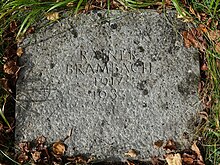Rainer Brambach

Rainer Brambach (born January 22, 1917 in Basel as Reinhard Brambach ; † August 14, 1983 ibid ) was a German - Swiss writer .
Life
Rainer Brambach was the son of a piano tuner from Rheinbach in the Rhineland, Franz Philipp Brambach (1859–1940), who had settled in Basel in 1908. His mother's name was Mina Born (1876–1966) and came from Niederbipp . He grew up in the St. Johann quarter and reluctantly completed an apprenticeship as a flat painter from 1932 after finishing secondary school . Then from 1934 he also worked as a furniture maker, peat cutter and advertising copywriter . In the thirties he undertook extensive hikes through Germany, Austria and France.
Expelled from Switzerland as a German, he took a job as a painter in Stuttgart in 1939 and was drafted into the German armed forces when the war broke out . He deserted and went back to Switzerland, where he was temporarily interned in Witzwil . From 1943 he worked as a horticulturist in Basel, with an interlude from 1947–1951 in the graphic studio Rolf Rappaz ; from 1959 he lived in Basel as a freelance writer. In 1974 he was naturalized in Basel.
Rainer Brambach's work, which was created since 1947, consists essentially of poems and stories . In his quiet, melancholy lyric poetry, which is shaped by the gardener's experience of nature, as in his prose he cultivated a simple, restrained style away from literary fashions. He received decisive support from Hans Bender , the founder and long-time editor of the literary magazine Akzente . He, in turn, put Werner Lutz in touch with poets and editors (such as Hans Bender).
Ulea Schaub was the last life partner of Rainer Brambachs. She met him in 1966 and stayed with him until his death. Brambach died on August 13, 1983 and was buried on August 18, 1983 in the Hörnli cemetery.
The estate of Rainer Brambach has been in the Basel University Library since 2000 .
Awards
- 1955: Hugo Jacobi Prize
- 1958: Promotion award of the cultural group in the Federal Association of German Industry
- 1965: Honorary gift from the city of Basel
- 1973: Levaillant Prize
- 1977: Art Prize of the City of Bern
- 1982: Art Prize of the City of Basel
Works
Single issues
- Seven poems. Private print 1947.
- Day's work. Poems. Fretz & Wasmuth, Zurich 1959.
- Perceptions. Prose. Fretz & Wasmuth, Zurich 1961.
- Marco Polo's suitcase. Poems (with Jürg Federspiel ). Diogenes Verlag , Zurich 1968.
- I couldn't find a name for it. Poems. Diogenes Verlag, Zurich 1969.
- For six cups of coffee and other stories. Diogenes Verlag, Zurich 1972.
- Bar songs. Poems (with Frank Geerk ). Illustrated by Tomi Ungerer . Diogenes Verlag, Zurich 1974.
- Flip a coin. Poems. Diogenes Verlag, Zurich 1977.
- Nobody will come .
- Also in April. Poems. Diogenes Verlag, Zurich 1983.
- It would be time. Poems and prose from the estate. Loeper, Karlsruhe 1985.
Collective editions
- Joy in the garden. The entire work, ed. v. Frank Geerk. Diogenes, Zurich 1989, ISBN 3-257-01821-5 .
- Letters 1955–1983. (with Hans Bender), ed. v. Hans Georg Schwark. From Hase & Koehler, Mainz 1997, ISBN 3-7758-1360-8 .
- Collected poems. With an afterword by Hans Bender. Diogenes, Zurich 2003, ISBN 3-257-06351-2 .
Editing
- Günter Eich : poems, prose, radio plays. Ex libris, Zurich 1968
- Modern German love poems from Stefan George to the present. Diogenes (detebe 216), Zurich 1980, ISBN 3-257-20777-8 .
Translations
- Eugène Guillevic : Carnac and the Chansons of Antonin Blond (with Claire Brambach). Kösel, Munich 1968
literature
- Hans Bender (Ed.): "Friends remember me". To the poet Rainer Brambach on the twentieth anniversary of his death. Keicher, Warmbronn 2003, ISBN 3-932843-54-1 .
- Theo Breuer : Rainer Brambach. In other words: from the hinterland. Poetry after 2000. Edition YE , Sistig 2005, ISBN 3-87512-186-4 .
- Frank Geerk , Tadeus Pfeifer (eds.): Poetry. Journal of Literature. With an obituary for Brambach. Volume 11, Issue 3, 1983.
- Franziska Schürch, Isabel Koellreuter : Rainer Brambach - I weigh 80 kilos, and life is mighty. A biography. Diogenes, Zurich 2016, ISBN 978-3-257-06978-5 .
Web links
- Publications by and about Rainer Brambach in the Helveticat catalog of the Swiss National Library
- Literature by and about Rainer Brambach in the catalog of the German National Library
- Rainer Brambach's estate in the Basel University Library
- Rainer Brambach in the Basel Literary Archive of the University Library of Basel
- Ruedi Graf: Brambach, Rainer. In: Historical Lexicon of Switzerland .
- File number PD-REG 3A 56069: Rainer Brambach (blog of the State Archives Basel-Stadt, accessed on September 10, 2017)
- Entry on Rainer Brambach in the Bibliomedia Foundation's authors' directory
- Rainer Brambach In: Swissbib
- Michael Lusier: The gardener who becomes a poet In: SRF , January 22, 2017
- Michael Luisier: Rainer Brambach - for the hundredth of the Basel poet In: SRF , January 20, 2017
Individual evidence
- ↑ Michael Lusier: The gardener who becomes a poet. Retrieved October 25, 2019 .
- ↑ Hans Bender: Like the lines of my hand. Records 1988-1998 . Munich and Vienna: Hanser, 1999. p. 103
- ^ Rainer Brambach, Frank Geerk, Tomi Ungerer: Kneipenlieder. Retrieved October 25, 2019 .
- ^ With the funeral oration on August 18, 1983 by Frank Geerk. Other contributions by Rudolf Peyer , Karl Kloter , Nino Erné , Thomas Heckendorn, Ursula Steiger, Helge Lüdicke. Ill. Ursula Stingelin.
| personal data | |
|---|---|
| SURNAME | Brambach, Rainer |
| ALTERNATIVE NAMES | Brambach, Reinhard (real name) |
| BRIEF DESCRIPTION | German-Swiss writer |
| DATE OF BIRTH | January 22, 1917 |
| PLACE OF BIRTH | Basel |
| DATE OF DEATH | August 14, 1983 |
| Place of death | Basel |